Gale Lucas
Social Influence Dialogue Systems: A Scoping Survey of the Efforts Towards Influence Capabilities of Dialogue Systems
Oct 11, 2022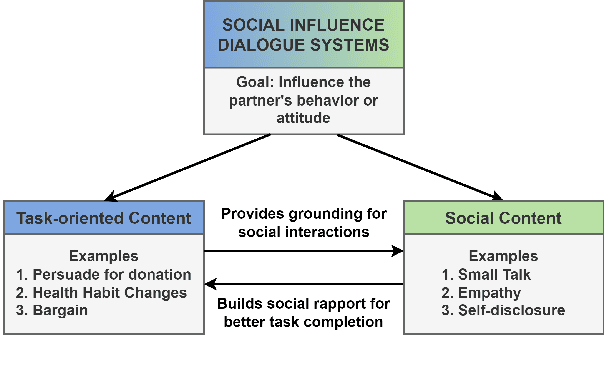
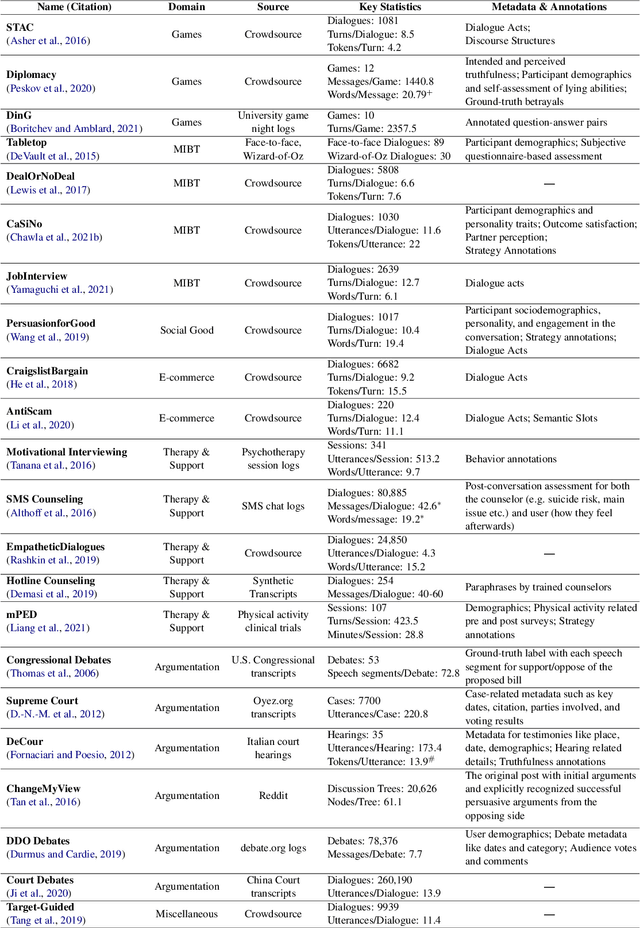
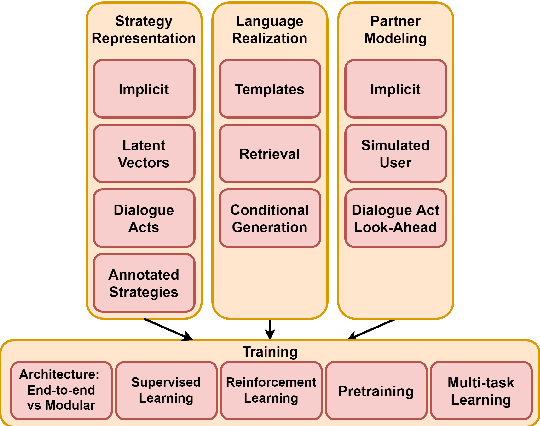
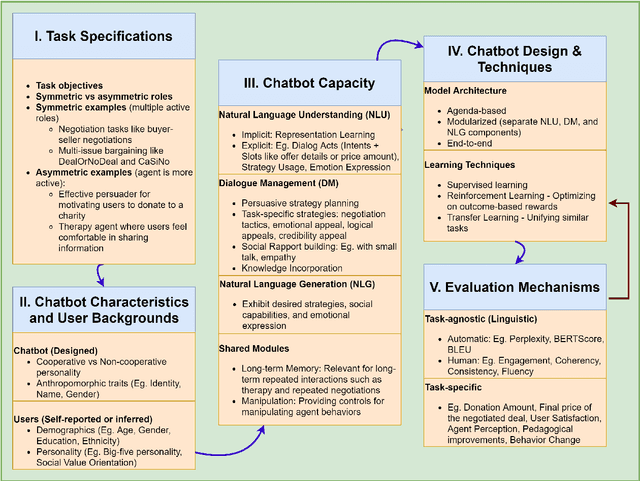
Abstract:Dialogue systems capable of social influence such as persuasion, negotiation, and therapy, are essential for extending the use of technology to numerous realistic scenarios. However, existing research primarily focuses on either task-oriented or open-domain scenarios, a categorization that has been inadequate for capturing influence skills systematically. There exists no formal definition or category for dialogue systems with these skills and data-driven efforts in this direction are highly limited. In this work, we formally define and introduce the category of \emph{social influence dialogue systems} that influence users' cognitive and emotional responses, leading to changes in thoughts, opinions, and behaviors through natural conversations. We present a survey of various tasks, datasets, and methods, compiling the progress across seven diverse domains. We discuss the commonalities and differences between the examined systems, identify limitations, and recommend future directions. This study serves as a comprehensive reference for social influence dialogue systems to inspire more dedicated research and discussion in this emerging area.
Towards Emotion-Aware Agents For Negotiation Dialogues
Jul 28, 2021

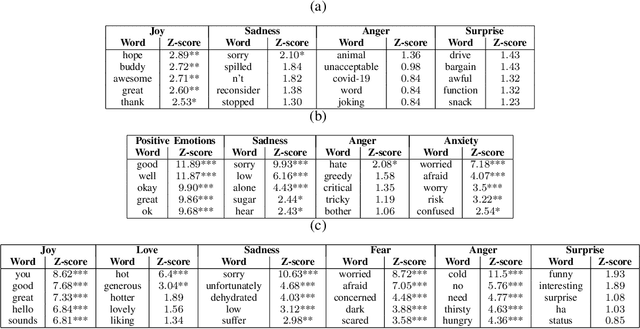
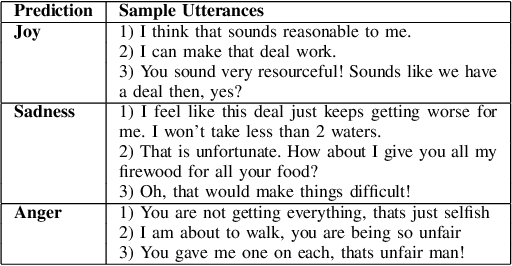
Abstract:Negotiation is a complex social interaction that encapsulates emotional encounters in human decision-making. Virtual agents that can negotiate with humans are useful in pedagogy and conversational AI. To advance the development of such agents, we explore the prediction of two important subjective goals in a negotiation - outcome satisfaction and partner perception. Specifically, we analyze the extent to which emotion attributes extracted from the negotiation help in the prediction, above and beyond the individual difference variables. We focus on a recent dataset in chat-based negotiations, grounded in a realistic camping scenario. We study three degrees of emotion dimensions - emoticons, lexical, and contextual by leveraging affective lexicons and a state-of-the-art deep learning architecture. Our insights will be helpful in designing adaptive negotiation agents that interact through realistic communication interfaces.
CaSiNo: A Corpus of Campsite Negotiation Dialogues for Automatic Negotiation Systems
Mar 29, 2021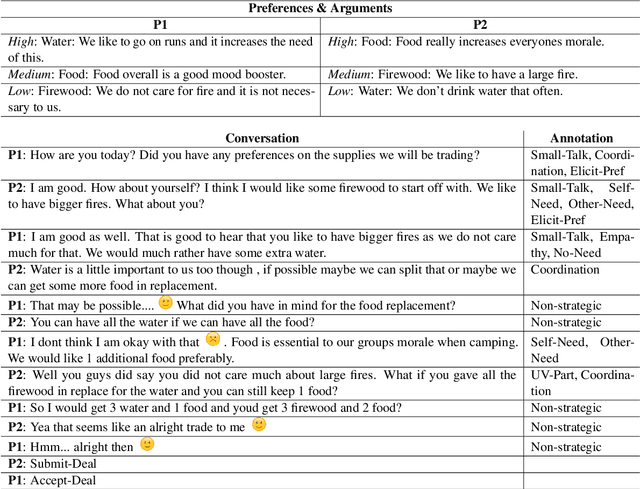
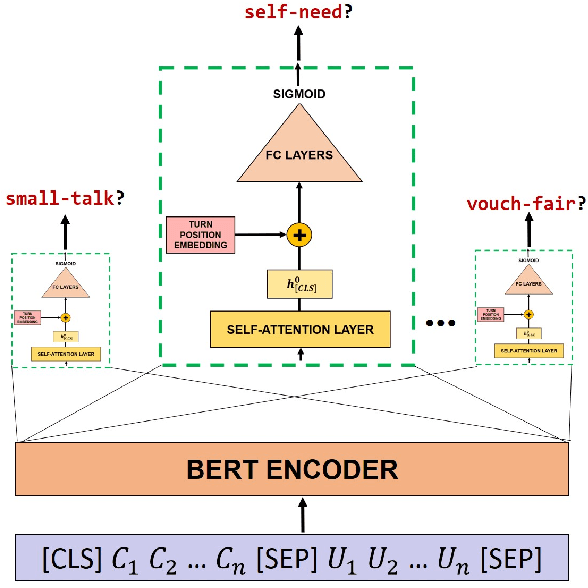
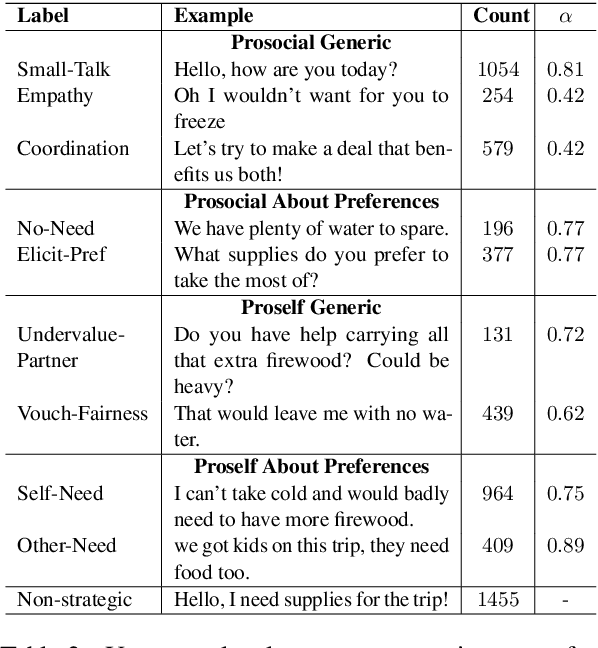
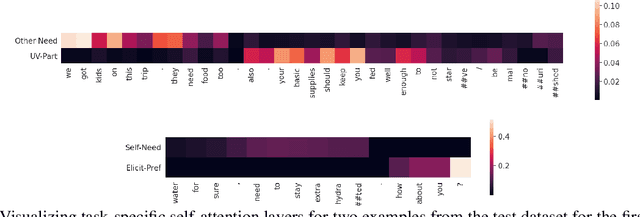
Abstract:Automated systems that negotiate with humans have broad applications in pedagogy and conversational AI. To advance the development of practical negotiation systems, we present CaSiNo: a novel corpus of over a thousand negotiation dialogues in English. Participants take the role of campsite neighbors and negotiate for food, water, and firewood packages for their upcoming trip. Our design results in diverse and linguistically rich negotiations while maintaining a tractable, closed-domain environment. Inspired by the literature in human-human negotiations, we annotate persuasion strategies and perform correlation analysis to understand how the dialogue behaviors are associated with the negotiation performance. We further propose and evaluate a multi-task framework to recognize these strategies in a given utterance. We find that multi-task learning substantially improves the performance for all strategy labels, especially for the ones that are the most skewed. We release the dataset, annotations, and the code to propel future work in human-machine negotiations: https://github.com/kushalchawla/CaSiNo
Effective Favor Exchange for Human-Agent Negotiation Challenge at IJCAI 2020
Sep 14, 2020Abstract:This document describes Pilot, our submission for Human-Agent Negotiation Challenge at IJCAI 2020. Pilot is a virtual human that participates in a sequence of three negotiations with a human partner. Our system is based on the Interactive Arbitration Guide Online (IAGO) negotiation framework. We leverage prior Affective Computing and Psychology research in negotiations to guide various key principles that define the behavior and personality of our agent. Pilot has been selected as one of the finalists for presentation at IJCAI.
BERT in Negotiations: Early Prediction of Buyer-Seller Negotiation Outcomes
Apr 06, 2020



Abstract:The task of building automatic agents that can negotiate with humans in free-form natural language has gained recent interest in the literature. Although there have been initial attempts, combining linguistic understanding with strategy effectively still remains a challenge. Towards this end, we aim to understand the role of natural language in negotiations from a data-driven perspective by attempting to predict a negotiation's outcome, well before the negotiation is complete. Building on the recent advancements in pre-trained language encoders, our model is able to predict correctly within 10% for more than 70% of the cases, by looking at just 60% of the negotiation. These results suggest that rather than just being a way to realize a negotiation, natural language should be incorporated in the negotiation planning as well. Such a framework can be directly used to get feedback for training an automatically negotiating agent.
 Add to Chrome
Add to Chrome Add to Firefox
Add to Firefox Add to Edge
Add to Edge